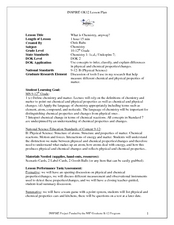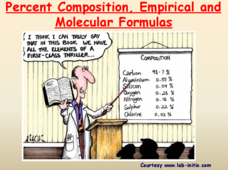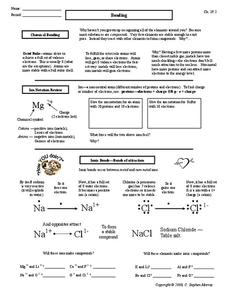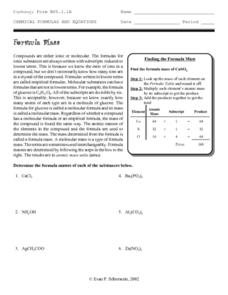Curated OER
What Is Chemistry, Anyway?
Students differentiate physical and chemical change. For this chemistry lesson, students list examples of those changes. They apply what they learned in a Jeopardy style team game.
Virginia Department of Education
Formulas and Percent Compositions of Ionic Compounds
Try not to blind anyone with science by following the safety rules. The lesson encourages scholars to form an ionic compound from magnesium and chlorine. Then they determine the empirical formula and determine the mole ratio and percent...
National Institute of Open Schooling
Coordination Compounds
Cyanide, a coordination compound, is used in the extraction of gold and silver. Part 24 in the series of 36 delves into the world of coordination compounds. Classes learn, through readings, discussions, and answering questions, how to...
Science Geek
Percent Composition, Empirical and Molecular Formulas
Help your pupils understand when empirical becomes molecular. The lesson presentation demonstrates the connection between empirical formulas and molecular formulas. Then, given percent composition, the lesson demonstrates the steps to...
Curated OER
Periodic Table & Its Trends
Students review atomic structure and then participate in a activity in which they categorize several "elements" into some form of order based on their properties. They discuss the trends they see. They also practice several electron...
Curated OER
Balancing Act
In this balancing chemical equations worksheet, students learn how to use coefficients to balance chemical equations. They practice balancing 7 equations and are given one challenge equation to balance.
Curated OER
Bonding
In this bonding learning exercise, students read about the two different types of chemical bonding: ionic and covalent bonds. Students review ion notation and oxidation numbers. This learning exercise has 24 fill in the blank, 2...
Curated OER
Bonding Basics Review
In this bonding learning exercise, students complete a chart of elements, their symbols, the total number of electrons, the number of valence electrons and the oxidation numbers. They draw Lewis structures for atoms and show the transfer...
Curated OER
Relative Masses
Students investigate relative mass using 8 different items. In this relative masses lesson plan, students discuss as a class John Dalton's atomic theory. They take the masses of the 8 items and record their data. They discuss relative...
Curated OER
Oxidation/Reduction Reactions
In this chemical reactions worksheet, students review the oxidation number rules and then assign oxidation numbers to atoms in given compounds. Students identify the reducing agent and the oxidizing agent in reactions. Students practice...
Curated OER
Balancing Equations Online
In this balancing equations worksheet, learners use an on line source to answer questions about balanced equations and they write balanced equations for various types of reactions. They balance equations using an on line game that allows...
Curated OER
Empirical Formulas
In this empirical formulas worksheet, students read about determining empirical formulas from chemical formulas. They determine the empirical formula given ten molecular formulas. They also find the molecular formulas given the mass and...
Curated OER
Periods and Groups; Valence Electrons; Masses
In this periods, groups, valence electrons and masses worksheet, students are given information about all these components of the periodic table. Students identify 4 elements in specific periods and groups, they find the valence...
Curated OER
Integrating Physics-Atomic Fingerprints
In this atomic fingerprint instructional activity, students read about the Bohr model and electrons changing energy levels and emitting energy. They answer questions about the atomic spectrum and the fingerprints for specific atoms.
Curated OER
pH Scale, acids and bases
Eighth graders define the pH scale, acids and bases. They distinguish between acidic and basic solutions using litmus paper. Students review simple chemical formulas. They define the subscript and coefficient in terms of chemical...
Curated OER
Periodic Table
In this periodic table activity, students are given 12 terms and must match the terms to their appropriate definition. Topics include types of bonds, types of elements, and types of ions.
Curated OER
Periodic Table
Students investigate the structure and development of the periodic table. In this periodic table lesson plan, students are given colored strips of paper that represent different atoms. They classify the atoms based on the paper's...
Curated OER
IPC Chemistry Review
In this chemistry review activity, high schoolers classify and name compounds, calculate atomic mass, draw Lewis Dot Diagrams, and determine number of protons for atoms. This activity has 37 fill in the blank, 38 matching, and 3 short...
Curated OER
Formula Mass
In this formula mass worksheet, students read about molecular substances and their formula masses. They find the formula masses for six compounds using the atomic masses of its elements.
Curated OER
Metals vs. Non-Metals: Dot Diagrams; Ions
In this metals, non-metals, dot diagrams and ions learning exercise, students read about each of these topics and they identify if 8 elements are metals or non-metals, they draw electron dot diagrams for 5 elements, they write the charge...
Curated OER
Understanding the Mole
High schoolers develop an understanding of the mole and molar masses of elements. In this mole lesson plan, students use beans to find their relative masses and draw parallels to the atomic masses of elements. High schoolers work in...
Curated OER
Radioactivity Experiments
Students study the difference between types of ionizing radiation and how elements are transmuted. They determine that radiation is normal and surrounds us. They calculate the amounts of alpha, beta and gamma radiation emitted from a...
Curated OER
Metals vs. Non-Metals
In this elements worksheet, students compare and contrast the characteristics of metals and non-metals. Students practice drawing Lewis dot diagrams and writing ion notation. This worksheet has 9 word problems, 8 matching questions, and...
Curated OER
Polymers Lab: Bouncy Ball and Slime
Eighth graders investigate chemical reactions to produce polymers. In this polymers lesson plan, 8th graders experiment with sodium silicate and ethyl alcohol to make a polymer. They also experiment with borax and glue to make a polymer....

























